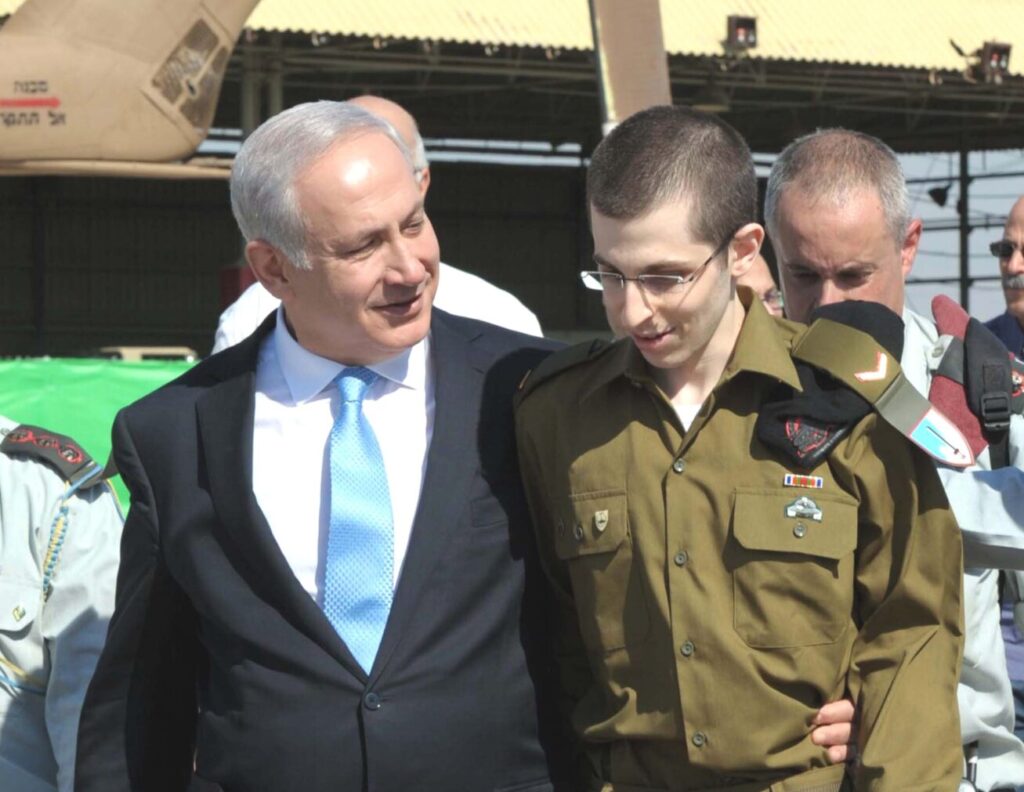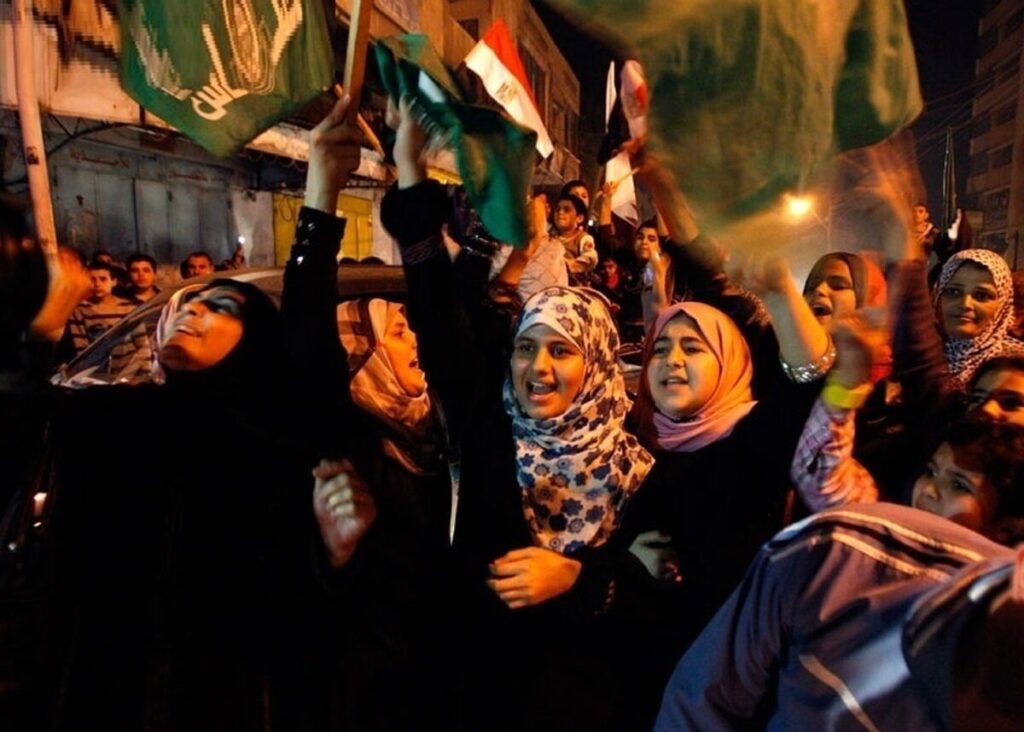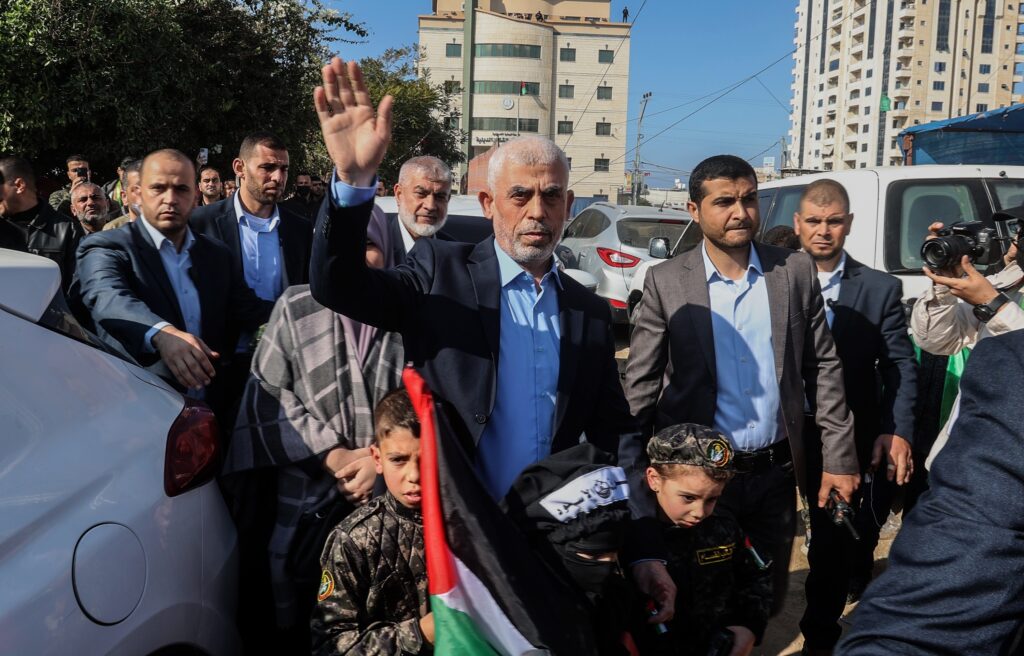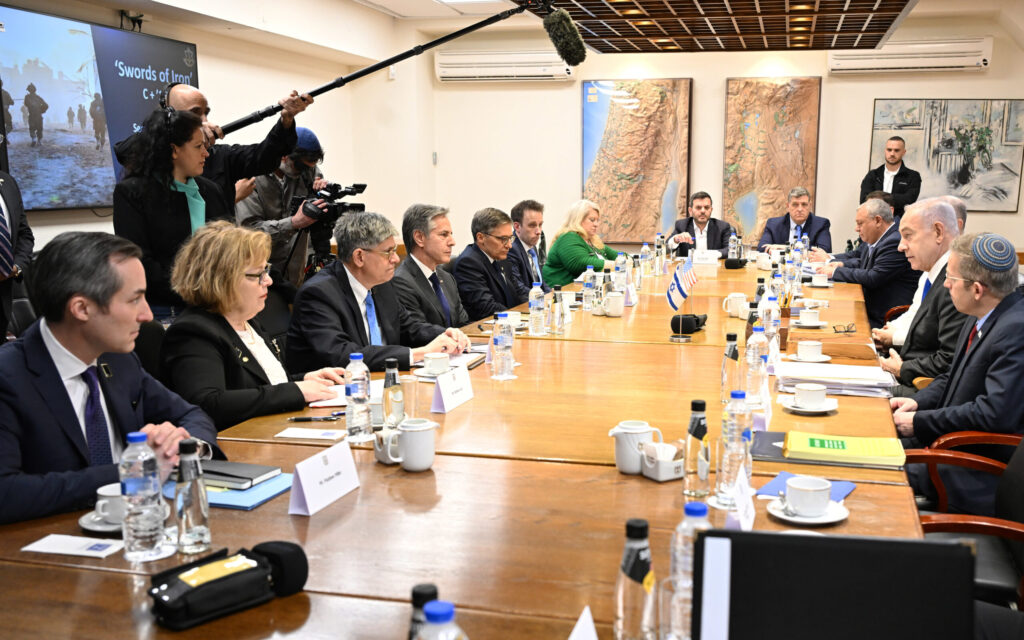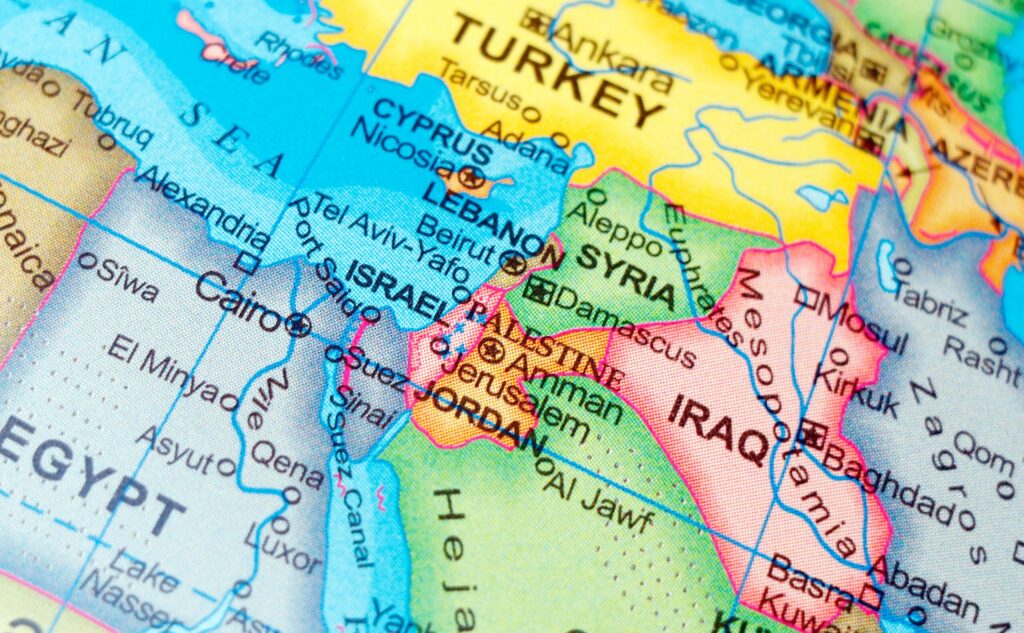UPDATES
Hamas in difficulties/ Saudi Arabia and the Iran nuclear deal
Nov 29, 2013
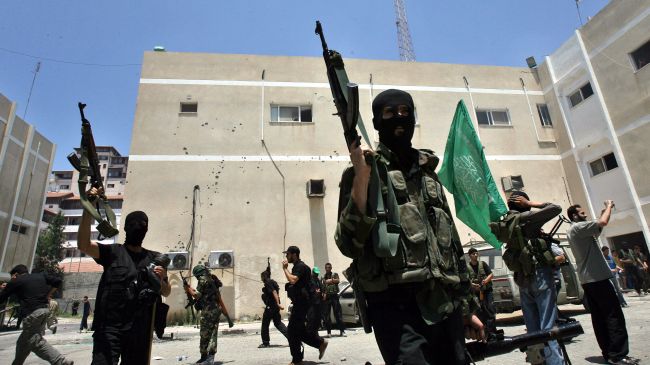
Update from AIJAC
November 29, 2013
Number 11/13 #06
This Update features two pieces on Hamas’ increasingly difficult situation in Gaza. It also includes an analysis, following up on the last Update, on the Saudi Arabian reaction to the interim nuclear deal signed with Iran last weekend.
First up is Israeli counter-terror specialist Ely Karmon on Hamas’ increasingly isolated situation internationally and domestic difficulties within their Gaza fiefdom. He notes that the fall of the Muslim Brotherhood regime in Egypt and the subsequent all-out efforts of the Egyptian army to close down smuggling into Gaza from Sinai have not only left Hamas in shock but also affected Hamas’ internal regime in Gaza. He makes an argument that it might be possible to make progress toward peace while Hamas is weakened, but also warns Hamas may have an incentive to initiate violence to forestall any peace progress. For all of Karmon’s detailed discussion, CLICK HERE. Karmon also did an interview with a German thinktank discussing the prospects and realities behind the peace talks, here.
Next up is Karl Vicks of Time magazine reporting from within Gaza on Hamas’ troubles there. He reports on how Hamas is seeking to re-establish its old links with Iran, but is finding it difficult. He also finds Gazans increasingly blaming Hamas for the deterioration of their situation, including a tunnel worker who appears to be affirming that long-standing Egyptian claims that Hamas fighters have been entering Egypt to attack the Egyptian army are true. For more on the ground reporting from inside Gaza, CLICK HERE.
Finally, Israeli academic specialist Bruce Maddy-Weinstein looks at the Saudi concerns about the interim Iran deal – as well as the wider context of these concerns. He notes that the issue which really initiated a major crisis in Riyadh-Washington relations was the Obama Administration’s handling of the Syrian chemical weapons crisis earlier this year, and that the new deal will only worsen it. While the Saudis have only limited leverage or options, he notes that the relationship nonetheless appears to be entering uncharted waters. For all of this analysis, CLICK HERE. Other important analysis of the increasingly fraught Saudi relationship with Washington comes from Washington Institute scholar Simon Henderson and American academic F. Gregory Gause.
Readers may also be interested in:
- More essential analysis of the Geneva interim Iran deal comes from Michael Rubin, Jonathan Spyer, Cliff May, and Israeli strategic analysts Gen. (ret.) Michael Herzog and Gen. (ret.) Amos Yadlin.
- Israel has just lost a cultural icon, the father of the vibrant modern Israeli music scene, Arik Einstein, who died Tuesday. Some writing about how central to Israeli culture Einstein has been over the last 40 years (he has been described as Israel’s Frank Sinatra, Elvis Presley and Bruce Springsteen all in one) is here, here and here. Two fairly different lists of his greatest songs, with video, are here and here.
- Isi Leibler writes about the need for a change in religious leadership in Israel.
- Some examples from the many stories and comments now appearing at AIJAC’s daily “Fresh AIR” blog:
- Aaron Shapiro on Israel’s discovery of Salafist terrorists in the West Bank.
- Daniel Meyerowitz-Katz on European policy toward Western Sahara versus the West Bank.
- Pieces on the Iranian nuclear deal by AIJAC’s Dr. Colin Rubenstein and Ahron Shapiro, in the Australian Financial Review and Melbourne Age, respectively.
Hamas in disarray
Ely Karmon
THE JERUSALEM REPORT, DECEMBER 2, 2013
There is now a window of opportunity to exploit the organization’s weakness, Egypt’s goodwill and Tehran’s restraint to advance the peace negotiations
A STRING of major regional developments over the past two years has left the Islamist Hamas government in Gaza in dire straits and opened up new opportunities for Israel and Palestinian moderates.
In backing the Sunni rebels in the Syrian civil war, Hamas forfeited its special ties with its biggest arms supplier, Iran; the mili- tary ouster of its Muslim Brotherhood allies in Cairo put serious strains on its relations with Egypt; and a change of leadership in Qatar left a big question mark over the extent of financial aid from the oil-rich Gulf state it can continue to count on.
The “axis of resistance” – Shi’ite Iran, Alawite Syria, Lebanese Shi’ite Hezbollah and the Sunni Hamas – survived until the beginning of the uprising in Syria, in 2011. As the civil war intensified, Hamas found its Sunni identity increasingly at odds with the non-Sunni axis to which it belonged. In December 2011, under strong external Sunni pressure, the Hamas leadership and all military operatives left Damascus and relocated to Gaza, Egypt, Qatar and Sudan.
The fall of the Mubarak regime in Egypt in February that year had opened the way for Hamas to return to the natural embrace of its parent organization, the Muslim Brotherhood, the rising power in post-revolutionary Egypt. With the Brotherhood’s backing, they hoped to be able first to challenge the Fatah-controlled Palestinian Authority, and then Israel. At the same time, Hamas found a place in the Sunni coalition of Qatar, Turkey and Saudi Arabia against the Assad regime in Damascus and its Iranian sponsor.
The estrangement from Iran and Syria, however, came at a price. Military aid from Iran ground to a halt. Ghazi Hamad, the Hamas Deputy Foreign Minister, confirmed in May this year that relations with Iran were “bad” and that “for supporting the Syrian revolution, [Hamas] lost very much” in the field of military cooperation.
Hamas had hoped that this strategic loss would be more than made up for by the new Muslim Brotherhood regime in Egypt. Initial signs were good. Although president Mohammed Morsi did not denounce the peace accords with Israel, he refused to deal directly with Israelis; moreover, the Muslim Brotherhood’s supreme spiritual guide Sheikh Mohammed Badie called for “jihad to liberate Jerusalem from the Israeli occu- pation”; and during the IDF Operation Pillar of Defense in Gaza, in November 2012, Morsi’s prime minister Hesham Kandil made a solidarity visit to Gaza declaring, “The cause of Palestinians is the cause of all Arabs and Muslims.”
However, the Muslim Brotherhood failed to deliver the goods. It failed to meet Gaza’s energy needs, and after 16 Egyptian soldiers were killed in Sinai by jihadist militants from Gaza in August 2012, Morsi’s Egypt closed down many of the Sinai-Gaza smug- gling tunnels, dealing a severe blow to the Gazan economy. Indeed, in late September, large protests in Gaza against rising prices of construction materials and fuel were direct- ed at Egypt as much as at Israel. Apart from symbolic support, Morsi was careful not to provide Hamas with any material aid or to threaten Israel with active Egyptian involve- ment – even during Israel’s Pillar of Defense operation against Gaza.
Nevertheless, the military takeover in Egypt in early July left Hamas in a state of shock. The campaign against Hamas by the new military-backed government, the state media and public opinion intensified in pro- portion to the growing violence of Muslim Brotherhood demonstrations across Egypt. Egyptian state television accused Hamas of training people to undertake car-bombing operations and the leading Egyptian state paper, Al-Ahram, cited high-ranking security sources who accused Hamas of involvement in the abortive assassination attempt against Interior Minister Mohammed Ibrahim in September.
Over the past three months the Egyptian army has destroyed most of the smuggling tunnels underneath the Sinai border with Gaza. For all intents and purposes, it has created a buffer zone by clearing buildings deemed a security threat up to one kilometer from the border.
Egyptian military, economic and media pressure has also impacted on Hamas’s political standing. In August, a Gazan version of the Egyptian Tamarud – the rebel movement that led the popular protests against Morsi in the run-up to his removal by the military – began preparations for mass demonstra- tions against Hamas on November 11, the anniversary of former Fatah leader Yasser Arafat’s death. Over the past two months, Hamas security agencies arrested dozens of Fatah activists and journalists charged with belonging to Tamarud.
MOREOVER, SAUDI Arabia, Kuwait and the Emirates support the Egyptian military crackdown against the Muslim Brotherhood and show no inclination to help its Palestin- ian branch in Gaza. In September, Jordan too turned down a request from Hamas to reopen its offices in Amman.
And in Qatar, which had supported Hamas with donations, grants and field projects (not cash) to compensate for the cessation of Iranian support, there was a change in leadership. In June, the emir Sheikh Hamad bin Khalifa al-Thani stepped aside for his son Sheikh Tamim bin Hamad al-Thani. The new ruler seems more likely to focus on domestic issues and will probably be more circumspect in his regional policies. There have already been reports of worsening ties between Hamas and Qatar – although senior Hamas officials deny this, and insist that Iran has not made a resumption of relations with Hamas conditional on its severing ties with Qatar.
Hamas’s staunchest diplomatic supporter is Turkey, but when Turkish Prime Minister Recep Tayyip Erdogan planned a high- profile solidarity visit to Gaza, he was barred by Egypt’s new rulers.
Hamas is also challenged in the Palestinian arena by the strengthening of Palestinian Au thority President Mahmoud Abbas’s standing and the possibility of progress in the PA’s peace talks with Israel. This could lead it to attempt to sabotage the negotiations through major terrorist attacks in the West Bank or in Israel proper, or through a campaign of missile and rocket fire from the Gaza Strip. This could elicit popular Egyptian pressure on the military regime in Cairo to support Hamas in the event of a major Israeli retaliation.
Hamas Political Bureau Chief Khaled Mashaal recently called for a unified Palestinian strategy to confront what he called “Israeli schemes of Judaization” in Jerusalem. This would be achieved by building an Arab, Islamic and Palestinian military cap bility to follow a widespread popular uprising designed to drain Israel on a daily basis.
Hamas also keeps open the option of renewed fighting against Israel by strengthening its alliance with the Gaza Salafist groups. Contacts between Hamas and the Salafists over the past few months, mediated by clerics from Kuwait and the influential Egyptian religious leader Sheikh Yusuf Al-Qaradawi, led to an agreement which reportedly grants the Salafists “freedom to operate in politics, the military arena, religious advocacy, as well as civil and social organizations.” In return, the Salafist factions “will commit to the cease-fire and other decisions made by the ruling Hamas movement.” Arrests and harassment of Salafists have ceased recently and many detainees have been released.
Ali Baraka, the chief Hamas representative in Lebanon, recently summarized the organization’s strategy concerning relations with its former allies. The fact that Hamas and Iran differ over how best to achieve a peaceful settlement in Syria does not mean they differ on everything else, he said. Hamas and Iran share the same positions on a number of key issues, including standing “against Israel and Zionist actions in the Middle East.” And he added that Hamas hopes the Syrian crisis will come to an end soon and allow the restoration of “the axis of resistance,” which “was seriously damaged by the Arab Spring.”
However, given Iran’s overtures to the West since Hassan Rouhani’s inauguration as president in August, Tehran will probably be very cautious in its regional conduct, especially towards a rogue organization like Hamas.
I have long held that the Israeli-Palestinian peace negotiations have little chance of success as long as the PA does not rule Gaza. There is now a window of opportunity to exploit Hamas’s weakness, Egypt’s goodwill and Tehran’s restraint to advance the peace negotiations.
The idea would be to impose PA control over Gaza, divide the Hamas movement by giving the more pragmatic Hamas leaders incentives to be part of a new joint regime, and by offering the Palestinians in the West Bank and Gaza better economic and territorial conditions in the short-term, and, in the long-term, a clear compromise acceptable to all parties.
Dr. Ely Karmon is a senior research scholar at the Herzliya-based Interdisciplinary Center’s Institute for Counter-Terrorism
Back to Top
————————————————————————
Hamas Is in Trouble in Gaza and Looking to Iran for Help
The stock of the militant Islamist organization has plummeted in the past year as conditions in its enclave of Gaza grow worse
A year ago Hamas was riding higher than it ever had. The militant Palestinian group had not only survived another round of fighting with Israel, it had renewed its credentials as a “resistance organization” in the process, firing as many missiles out of the Gaza Strip as the Israeli military fired in and hoisting rockets for the first time toward Tel Aviv and Jerusalem. Listed as a terrorist organization by the State Department and European Union, it had nonetheless hosted foreign emissaries — the prime minister of Egypt, the foreign minister of Turkey – during the height of the fighting, bolstering a claim on statesmanship first tasted with the celebrated visit of the emir of Qatar a month earlier.
The cease-fire ending last November’s hostilities was brokered by then-Egyptian President Mohamed Morsi, a fellow traveler in the Muslim Brotherhood flagship of political Islam that had also produced Hamas. And the terms of the document, calling for the two sides to “improve conditions for people in the Gaza Strip,” allowed Hamas to claim a victory, buttressed by a massive rally 16 days later. The headliner was Khaled Meshaal, the charismatic chairman of the Hamas movement whose star was rising so steadily in Palestinian politics that, in some West Bank circles, he was being mentioned as a likely successor to Mahmoud Abbas as head of the Palestine Liberation Organization.
Today, Hamas has none of those things, nor any apparent prospect of recovering them. Egypt’s Morsi is in custody, replaced by a military-backed government that casts Hamas as an enemy, and has sealed Gaza’s western border nearly as tight as Israel patrols the other three. “Worse than Mubarak,” says Fawzy Barhoom, spokesman for the Islamic Resistance Movement (the full name of Hamas), referring to the Egyptian autocrat who ruled until 2011 for three decades in strategic concert with Israel. Now, Qatar suddenly has other priorities and Iran no longer provides the perhaps $120 million a year it sent Hamas until the group’s political leadership left Damascus in solidarity with the Syrian population being mowed down by President Bashar Assad – Iran’s ally.
“It’s not frozen, but it’s still cold,” Barhoom tells TIME of the relationship with Tehran. “That doesn’t mean it’s going to continue cold forever.”
Nothing is forever, but time is not on Hamas’ side. The streets of Gaza are dark and awash in sewage, the Strip’s power grid strangled and pumping stations flooding as a consequences of Egypt shutting down hundreds of the smuggling tunnels that a senior Hamas official calls “the artery of survival.” Egypt’s action had the twin effect of severing the flow of cheap diesel and leaving Hamas cash poor from the loss of taxes it no longer collected on goods coming through tunnels.
“They are entitled to do this,” says tunnel worker Ahmed Salem, 25, referring to the Egyptians. “They are entitled to defend their country. Hamas is the one who is responsible for this.”
For what? “Weapons,” Salem says. ”And the people who go through the tunnels to Egypt and kill their soldiers. Yes, it happens.”
Hamas came to power in Gaza by winning 2006 legislative elections for the Strip and the West Bank, an outcome that surprised even its leaders. The secular Fateh party had been favored, but a potent backlash against its corruption and general ineffectiveness – Fateh split its own vote by running multiple candidates for the same slot – put Hamas in the role of governing. After months of maneuvering by both parties, Israel and Washington, the contest turned violent, as Hamas kicked Fateh out of Gaza. Palestinian politics has been divided by both ideology and geography: Fateh remains in control of the about 2.5 million Palestinians living on the West Bank. And in Gaza, Hamas struggles to reconcile its commitment to militancy – its onetime signature weapon, the suicide bombings, has been replaced by rockets fired randomly into Israeli population centers — with the practicalities of governance.
In the afterglow of last November’s fighting, the group briefly appeared to have found the formula. At the time, a poll by the well-regarded Palestinian Center for Policy and Survey Research based in Ramallah showed Hamas’ Ismail Haniyeh would have beaten Fateh’s Mahmoud Abbas for president of the Palestinian Authority, the executive position Abbas won in 2006. But Hamas has faded in every poll since, and today stands as isolated as it has been in years.
“The current situation is intolerable,” says Rawan Atawna, 19, a teaching student at Al Azhar University in Gaza City, a campus with a reputation as a Fateh stronghold. “Hamas became a tyrant.”
Barhoom describes the situation as a familiar one. When Hamas found itself suddenly alone in power in 2007, he says, it had to scrape to pay salaries and govern by triage much as it does today. But many Gazans say they expect more from a party seven years in power. In its most recent survey, the Palestinian Center found only one in five had a positive view of life in Gaza, and Hamas was seen as nearly as corrupt as Fateh.
“Always, you hold responsible the one in power,” says Mohammed Allool, 31, a computer specialist in Gaza City.
“The problem is we tried both,” notes Ibstam Nhoor, 45, whose husband was killed in the Second Intifada, which lasted from 2000 to 2005. “’We tried Fatah. We tried Hamas. Neither brought us anything.”
Analysts say Hamas’ weakness makes it even less likely that the (repeatedly-announced) political reconciliation with Fateh will in fact go forward on a practical level in the visible future. Less clear is whether the many pressures on Hamas will make it more militant, or less. Under Meshaal, the group has steered a relatively moderate course in recent years, and with the ascent of the Brotherhood elsewhere in the region was poised to lay claim to the political mainstream. Now it’s keen to cozy back up to Iran, Barhoom acknowledges, a courtship he expects to bear fruit if only because in the Palestinian political equation, the alternative is a Fateh party committed to U.S.-sponsored peace talks with Israel that appear to be going nowhere.
“They cannot stop supporting the resistance,” Barhoom says of the Iranians. “What are they going to support? The negotiations?”
Back to Top
————————————————————————
Alarm bells in Riyadh
Saudi Arabia has repeatedly struggled to make sense of US President Barack Obama’s policy on the Middle East
Bruce Maddy-Weinstein
Jerusalem Report, December 16, 2013
THE G5+1 talks in Geneva produced an interim agreement limiting Iran’s nuclear program in return for the partial easing of international sanctions. One already obvious outcome is a crisis of confidence in Riyadh regarding the actions and intentions of its longstanding ally and patron, the United States.
US-Saudi relations have known ups and downs over the years. Notable downs – the Saudi-led oil embargo in 1973 and the American frustration with Saudi Arabia’s failure to support Egyptian president Anwar Sadat’s peace initiative and the signing of the Camp David Accords with Israel in 1978 – were connected to fundamental differences on the Arab-Israeli conflict. But they never led to a rupture in relations.
Although Saudi-American relations lack the shared affinities, values and mutual familiarity that are integral to the US-Israeli relationship, Saudi-US ties have been grounded in deep-rooted common interests. For the US, this meant insuring a reliable supply of oil at bearable rates to fuel Western economies and maintaining Western security interests and regional stability, during the Cold War and since then; for Saudi Arabia, there was only one priority – regime survival and well-being.
The Nixon Doctrine of 1969 proclaimed Saudi Arabia to be one of the “regional influentials” vital for US security (the Shah’s Iran, iron- ically, was the other), and Saudi Arabia played a central facilitating role in the US-sponsored Afghan war against occupying Soviet forc- es. Nothing epitomized the US commitment to Saudi Arabia’s securi- ty better than Operations Desert Shield and Desert Storm in 1990-91.
And over the decades, many layers of economic and defense- related ties were built up, as Saudi petro-wealth was recycled through US companies eager to participate in Saudi Arabia’s massive development schemes. No less than 80,000 Saudi students are currently studying in US universities. To be sure, the fact that most of the 9-11 bombers were Saudi citizens caused major damage to the Saudis’ image in the US, but the relationship endured, and even deepened, as the Saudis eagerly assisted the US in its “war on terror” against al-Qaeda.
Saudi Arabia’s vulnerability to external threats has been its en- during concern. Traditionally, Riyadh preferred quiet diplomacy, alliance-building and working in the shadows, while avoiding direct confrontation with stronger countries. In recent years, however, it has become more assertive.
In the Arab-Israeli arena, it spearheaded the Arab Peace Initiative; during the 2006 Second Lebanon War, it cast much of the blame on Hezbollah and its Iranian patron. And in the Arab Spring upheavals, it led the Gulf Cooperation Council’s intervention in support of Bahrain’s crackdown on opposition Shi’ite protests, shepherded the ousting of Yemen’s embattled president, legitimized, via the Arab League, the NATO-led overthrow of Libya’s Qaddafi and, finally, supported the Sunni-led rebellion against the Assad regime in Syria.
Throughout these uncharted waters, Riyadh has repeatedly struggled to make sense of US president Barack Obama’s policy on the Middle East. Washington’s abandonment of Egypt’s Hosni Mubarak, a longtime ally, stunned and shocked; Saudi in- tervention in Bahrain came directly after the US had called on the regime to engage in a dialogue with the opposition protesters; it was stunned again by Obama’s 11th-hour pullback from a military strike against Syria in favor of a deal with Russia to confiscate Syria’s chemical weapons.
The Saudi press and some Saudi officials have been scathing in their criticism of America’s failure to act in Syria. For the Saudis, it constituted a victory for President Bashar Assad and his patron in Tehran, whose support has been crucial to his survival. In protest, Riyadh turned down a seat on the UN Security Council, calling the body unable to fulfill its mission of ensuring peace and security. And now, with the US reaching a diplomatic agreement with Iran on its nuclear program, Saudi Arabia looks on apprehensively, fearing that the renewal of a US-Iranian relationship will come at its expense, and without regard for its interests.
Does it have options or leverage? One report spoke of plans to attain nuclear weapons capability via Pakistan. Another option was to initiate a nuclear enrichment program to match Iran’s. Manipulating oil pricing and production, offering lucrative contracts to non-US companies, and promoting greater militancy on the Palestinian-Israeli front are other possibilities. Presumably, there is disagreement within the Saudi hierarchy about where things are headed, how much its US ally can be trusted, and how much distance Riyadh should put between it and Washington.
Although the ultimate Saudi nightmare – an Iranian-American “grand bargain,” which would confirm Iran’s preeminence in the region – is not in the cards, Saudi-US relations may be entering into uncharted waters.
The author is a Principal Research Fellow at the Moshe Dayan Center for Middle Eastern and African Studies, Tel Aviv University
Tags: Iran







